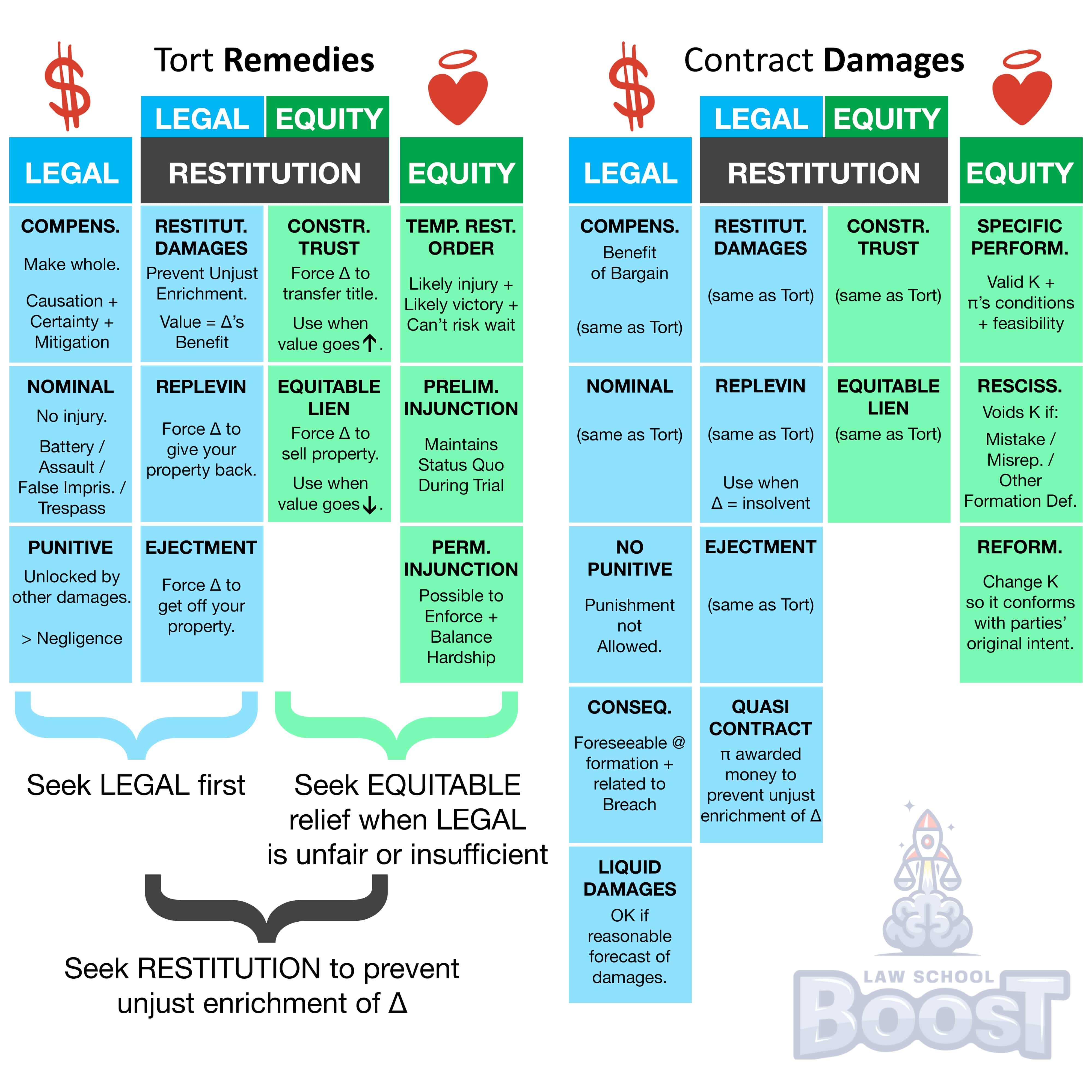🏥
Remedies • Contract - Equitable Remedies
REM#052
Legal Definition
Specific performance is a remedy where the court orders a defendant to perform the contract.
To successfully seek specific performance, a plaintiff must show (1) the contract is valid (i.e., certain and definite); (2) the plaintiff's contract conditions have been satisfied; (3) the plaintiff has no adequate legal remedy; and (4) enforcement is feasible.
To successfully seek specific performance, a plaintiff must show (1) the contract is valid (i.e., certain and definite); (2) the plaintiff's contract conditions have been satisfied; (3) the plaintiff has no adequate legal remedy; and (4) enforcement is feasible.
Plain English Explanation
Imagine you and a friend made a promise to trade toys, but then your friend backs out. Instead of giving you another toy or money as an apology, you just want the original toy you were promised. In the legal world, if someone doesn't do what they promised in a contract, the court can step in and say, "Hey, you need to do exactly what you promised." But there are rules! The person asking for this has to prove a few things:
(1) The promise (or contract) was clear and real.
(2) They did their part of the deal.
(3) Money or another toy won't fix the problem.
(4) It's possible to make the other person do what was promised.
#4 is super important. Since the 13th Amendment of the Constitution abolishes slavery, courts do not have the power to force someone to work against their will even if their labor is what was bargained for in the contract. In such cases, courts will prefer to award monetary damages to enable the plaintiff to find someone else to engage with.
(1) The promise (or contract) was clear and real.
(2) They did their part of the deal.
(3) Money or another toy won't fix the problem.
(4) It's possible to make the other person do what was promised.
#4 is super important. Since the 13th Amendment of the Constitution abolishes slavery, courts do not have the power to force someone to work against their will even if their labor is what was bargained for in the contract. In such cases, courts will prefer to award monetary damages to enable the plaintiff to find someone else to engage with.
Hypothetical
Hypo 1: Bob sells a unique, one-of-a-kind painting to Sam and promises to deliver it. After receiving payment, Bob refuses to give the painting to Sam. Result: The court orders Bob to give the painting to Sam because money can't replace this unique item, and Sam has already paid for it.
Hypo 2: Bob agrees to sell a piece of land to Sam. After Sam pays, Bob refuses to transfer the land's title. Result: The court makes Bob transfer the title to Sam because land is unique, and giving money back isn't the same as getting the land.
Hypo 3: Sam wants to hire Elon Musk to come to their birthday party and tell jokes. Sam and Musk enter into a contract. However, a week before Sam's birthday party, Musk tells Sam that he is unable to attend the birthday party. Sam sues and seeks specific performance. Result: Even though Sam and Musk had a valid contract, a court will not be willing to force Musk to show up at an event they no longer wish to be present at. As a result, the court will likely opt to award Sam with monetary damages so Sam can hire a different clown.
Hypo 2: Bob agrees to sell a piece of land to Sam. After Sam pays, Bob refuses to transfer the land's title. Result: The court makes Bob transfer the title to Sam because land is unique, and giving money back isn't the same as getting the land.
Hypo 3: Sam wants to hire Elon Musk to come to their birthday party and tell jokes. Sam and Musk enter into a contract. However, a week before Sam's birthday party, Musk tells Sam that he is unable to attend the birthday party. Sam sues and seeks specific performance. Result: Even though Sam and Musk had a valid contract, a court will not be willing to force Musk to show up at an event they no longer wish to be present at. As a result, the court will likely opt to award Sam with monetary damages so Sam can hire a different clown.
Visual Aids

Related Concepts
How does election of remedies affect a claim for rescission?
If a contract has a liquidated damages clause, is specific performance still an option?
What are common defenses to specific performance?
What are defenses to rescission?
What are equitable remedies in contract?
What are the defenses to formation?
What happens if a plaintiff is entitled to rescission but has already performed?
What is reformation?
What is rescission?
What is the part performance exception to the Statute of Frauds?
What type of mutual mistake is sufficient for rescission?
When applying specific performance to a land purchase contract, what happens if a buyer breaches a "time is of the essence" clause with a forfeiture clause?
When applying specific performance to a land purchase contract, what happens if the quantity of land is in dispute?
When assessing reformation, what constitutes sufficient grounds?
When assessing specific performance, how do courts weigh feasibility of enforcement?
When assessing specific performance to acquire a unique piece of property, when is uniqueness tested?
When assessing specific performance, what must the status be of a plaintiff's contractual conditions?
When assessing specific performance, why are money damages sometimes an inadequate legal remedy?
When assessing whether money damages are inadequate for specific performance, why does it matter whether a piece of property is unique and what kind of property is always unique?
When is personal property considered unique enough to trigger specific performance?
Will courts grant rescission for a unilateral mistake?


